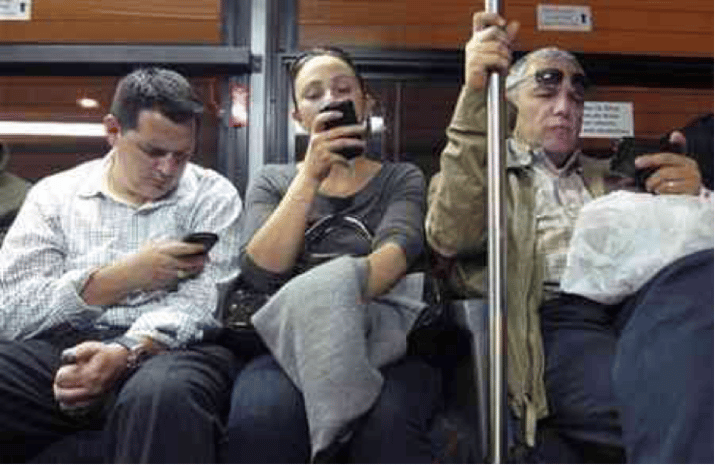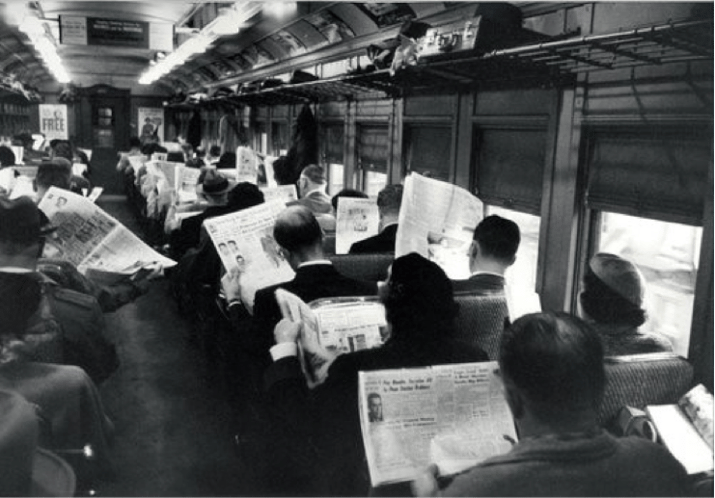This might be a controversial blog.
My Thanksgiving was one filled with texting, Skyping, Tweeting, FaceTime, Beam robots and ringing phones.
Some people HATE the way technology impacts their family at gatherings — people on digital devices rather than having conversations — 'making us more alone, even when we're together.' But is that really true?
This blog is about perspective on the impact of digital devices, and the bigger picture of what's going on: an accelerating trend whereby our connection with people is independent of our physical location.
It turns out that we've ALWAYS said that new technology isolates us…
P.S. Send any tips to our team by clicking here, and send your friends and family to this link to subscribe to Abundance Insider.

Source: xkcd.com/1601
"Back in my day, we didn't have all these distractions"
– Millions of disgruntled grandparents around the world.
"Yeah, in your day, life was pretty boring and disconnected."
– Millions of millennials today.
We've always preferred to get what we want, when we want. Every new communication technology has moved us closer to "immediate," "faster," "cheaper," "higher quality" and "instant" communications with whomever we want, whenever we want.
And that trend is accelerating.
The fact is we tend to romanticize the past. And we like to complain about the present. And we are resistant to change. Check out the two photos below that clearly tell that story.


The Upside of Technology
This Thanksgiving, I was in constant contact with relatives scattered around the world: one niece in Greece by FaceTime, another niece in Florida by Beam robot, and friends around the world by Skype, FaceTime and Beam.
100 Years Ago… holiday contact with distant relatives either didn't happen, happened through infrequent snail mail, or rarely through a long trek by horse and buggy. Ultimately, you were stuck with the locals — which is fine — unless the people you loved were a world apart…
50 Years Ago… a long-distance phone call served as the high-tech mode of 'connectedness.' The telephone offered reasonably immediate communications, except on holidays (for those of you who remember) when you couldn't actually get a line out ("All lines to that country are currently busy, please hang up and try later"). And, oh, by the way, it was really expensive.
Today… we've got instant, global, free, wireless communication capabilities in full-color, high-definition video, and even telepresence robots.
The bottom line is that technology allows us to more intimately connect with friends and family who are geographically distant, and this, in my opinion, is a really good thing.
So, what's the problem? Why concerns over "distraction" and "isolation"?
It's Not Only the Technology, It's Also Your Boring Uncle and Brainless Conversation
We (humans) tend to prioritize spending time with those people who bring us the most enjoyment or satisfaction.
We can blame the technology all we want… BUT this means messaging our best friends rather than having conversations at a dinner table with distant relatives with whom we have little in common. which seems like a better way to spend our time.
We can force it and try really hard — be polite, do the right thing. But when the barrier to connection drops so low that we can ditch the uncle and chat with the buddy, it's a tough thing to avoid.
The point here is that the quality of our connection is skyrocketing, and the barrier to connection is plummeting.
Thanksgiving – November 2028
What does Thanksgiving look like in November 2028, just 10 years from now?
I imagine much of it will look a lot like it does today.
Except that augmented reality and virtual reality (AR/VR) will account for half of the people around the dinner table.
On the augmented reality front, technologies from companies like HTC, Magic Leap, Microsoft and Apple will allow distant family members and friends to join in the conversation in a multitude of different fashions. Some may beam in from the other side of the planet, showing up as full-sized participants virtually sitting in the chair across the table, while others may be one-tenth-sized figures standing on the tabletop.
Or… in the case of virtual reality (or High Fidelity), we could imagine an hour-long pre-dinner reunion taking place in a completely virtual world with 100 distant family members joining from a dozen corners of the globe to exchange stories and catch up.
We are entering a period of rapid societal transformation. An era in which traditions will morph and limitations of decades past will lift, allowing us to recreate our social networks and celebrations.
Also read: TOP 50 MOON SHOTS
WHAT IS ABUNDANCE INSIDER?
This email is a briefing of the week's most compelling, abundance-enabling tech developments, curated by Marissa Brassfield in preparation for Abundance 360. Read more about A360 below.
WANT MORE CONVERSATIONS LIKE THIS? - JOIN ME
At Abundance 360, Peter's 360-person executive mastermind, we teach the metatrends, implications and unfair advantages for entrepreneurs enabled by breakthroughs like those featured above. We're looking for CEOs and entrepreneurs who want to change the world. The program is highly selective. Apply now for Abundance360 Summit if you'd like to develop an Abundance mindset.
Know someone who would benefit from getting Abundance Insider? Send them to this link to sign up.
P.S. I've just released a podcast with my dear friend Dan Sullivan called Exponential Wisdom. Our conversations focus on the exponential technologies creating abundance, the human-technology collaboration, and entrepreneurship. Head here to listen and subscribe.
Abundance Insider: November 24th, 2018


